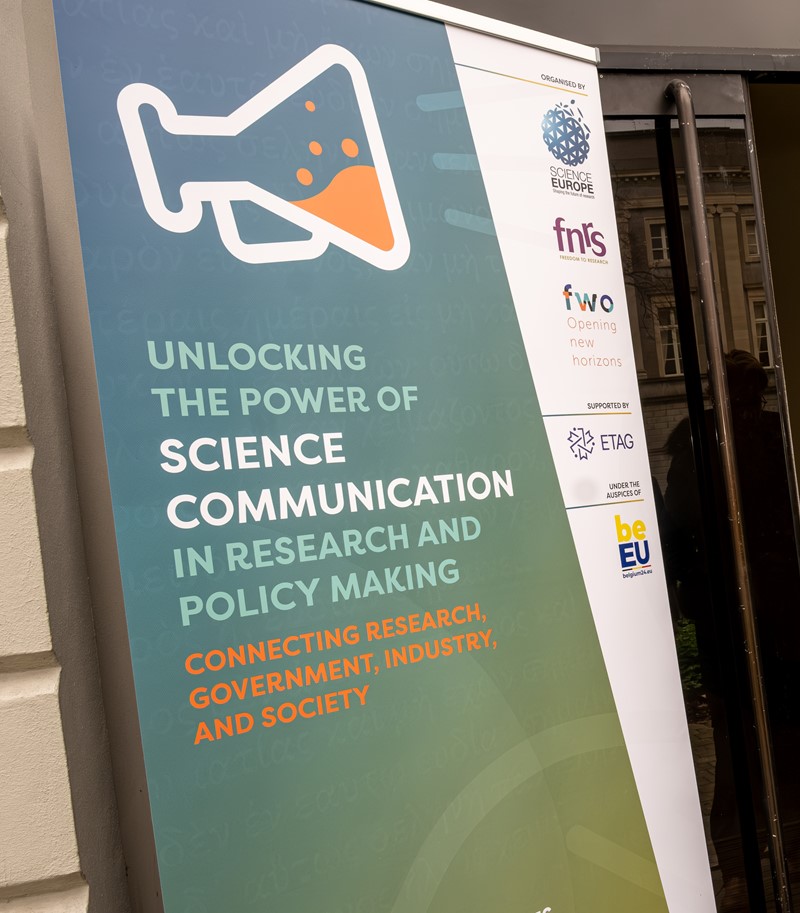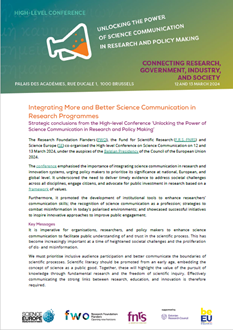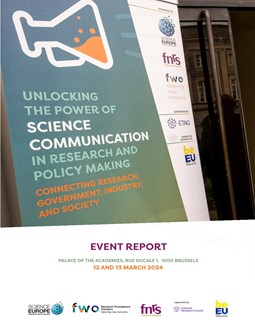
-
Share on
Unlocking the Power of Science Communication in Policy Making
Connecting Research, Government, Industry, and Society
This high-level conference was co-organised by the Research Foundation Flanders (FWO), Fund for Scientific Research (F.R.S.-FNRS), and Science Europe under the auspices of the Belgian Presidency of the European Union (January–June 2024). It brought together European policy makers and stakeholders to highlight the importance of open, ethical science communication in research processes. It also raised awareness of the need to address science communication more formally in research programmes.

About the Conference
In recent years, researchers have become increasingly involved in public communication programmes; the COVID-19 pandemic and other global challenges have accelerated this trend. Despite this, misinformation and ‘fake news’ about important social issues – such as artificial intelligence, big data, food security, energy, and climate change – continue to spread through social and new media. This has led to growing international recognition that science communication is an essential aspect of research culture.
Science Europe has as one of its priorities to “strengthen the voice of science in and for society”. As part of this, science communication has emerged as its own priority topic. In June 2022, Science Europe published a Position Statement that aligns its Member Organisations in the initiation of actions that contribute to fostering better and more effective evidence-based science communication. This statement was produced in full collaboration with the Working Group on Communication and adopted by Science Europe’s General Assembly.
Science Europe and its members envision a system that considers science communication as an important part of the research culture we want to build, and embeds it in a research framework based on open science, ethical standards, and renewed research assessment practices.
Objectives and Dynamics of the Conference
The main goal was to highlight the importance of science communication in research processes and raise awareness of the need to address it more formally in research programmes and policy making, in particular to:
- foster a better understanding of the importance of science communication in research and innovation systems and shift the mindset of policy makers at the national and the EU level.
- highlight the role of science communication in providing timely evidence relevant to societal challenges and policy making, informing and engaging citizens, explaining the importance of public investment in research, and inspiring new generations.
- promote the development of institutional tools for researchers to better communicate research, such as toolkits and guidelines, training activities, incentives, and integration of science communication into funding schemes.
- build partnerships with science communication stakeholders, intergovernmental bodies and media representatives to address misinformation as we navigate through an increasingly polarised, diverse, and volatile context.
- showcase successful science communication initiatives and best practices, including new and diverse forms of knowledge communication.
The conference included plenary sessions, panel discussions, deep dives, and networking opportunities. The plenary sessions with high-level keynote speakers provided an overview of the current state of science communication in Europe and worldwide and advocated the importance of science communication in addressing societal challenges and informing policy making. The panel discussions and pitch session showcased successful science communication initiatives and included policy makers and practitioners from the field. The deep dives focused on specific science communication topics and best practices from across Europe and beyond.
Outcomes of the Conference
As the overarching objective was to actively promote the seamless integration of science communication as an integral component within research programmes, two types of outcomes were envisaged:
- Strategic conclusions targeting policy makers on how to integrate more and better science communication in research programmes. These conclusions will feed the Belgian Presidency of the Council of the EU R&I priorities.
- Longer and more detailed recommendations for Science Europe members, including, for instance, suggestions on integrating science communication into research programmes and enhancing science communication training offers.

















